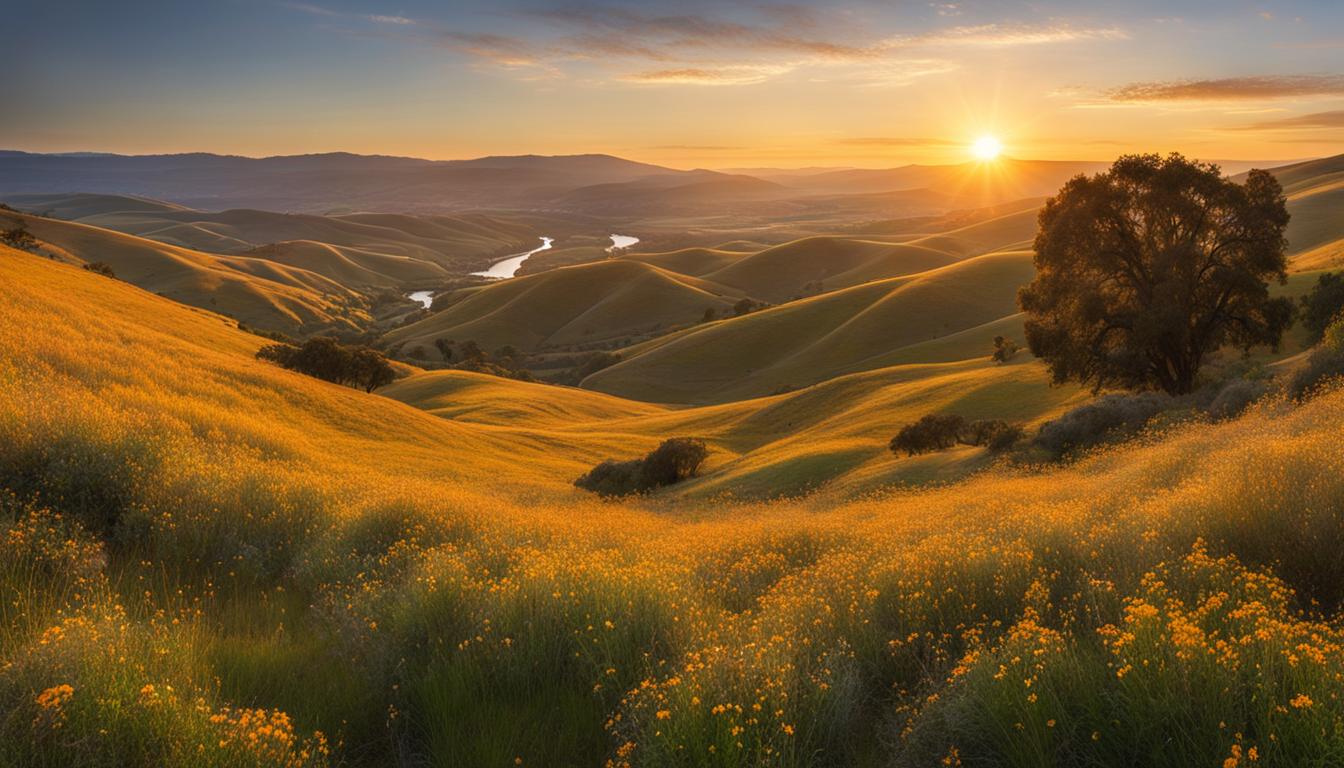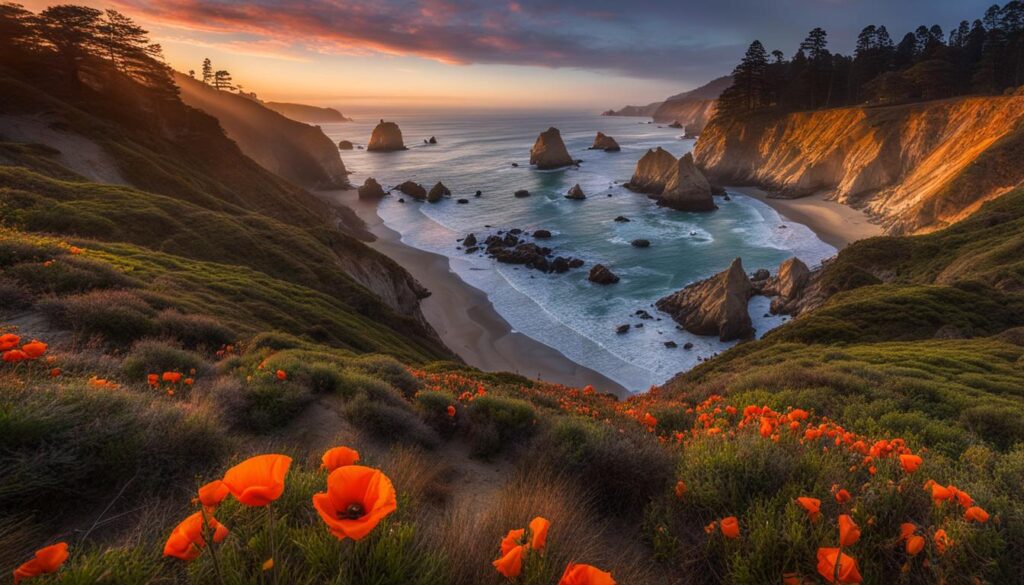Unraveling the Story: Why is California Called the Golden State?
California, fondly known as “The Golden State,” has a nickname that evokes curiosity and wonder. But have you ever wondered why this state in the western United States earned such a glittering title? Let’s explore the origin and significance of California’s nickname and uncover the fascinating story behind it.
- California earned the nickname “The Golden State” due to its association with the Gold Rush and the presence of golden poppy flowers.
- The nickname symbolizes California’s rich history, natural beauty, and economic success.
- The Gold Rush in the mid-1800s attracted thousands of people to California in search of gold, shaping the state’s early development and cultural identity.
- California’s diverse landscapes, including beaches, mountains, and forests, add to its natural beauty.
- The cultural impact of California, particularly in arts, entertainment, and technology, contributes to its significance as “The Golden State.”
The United States and its State Nicknames
The United States is a country known for its rich history and diverse culture. Each state within the country has its unique characteristics and cultural identity, often represented by a specific nickname. These state nicknames serve as a way to celebrate the distinctiveness and pride of each region. Let’s explore some of the most renowned state nicknames and unravel the stories behind them.
State Nicknames
Below is a list of selected state nicknames that highlight the diverse characteristics of each state:
- The Sunshine State – Florida
- The Lone Star State – Texas
- The Empire State – New York
- The Granite State – New Hampshire
- The Volunteer State – Tennessee
- The Golden State – California
These nicknames offer a glimpse into the unique qualities and iconic symbols associated with each state. From Florida’s sunny beaches to Texas’ independent spirit, each state carries a distinct pride in its culture and heritage.
Origins of State Nicknames
The origins of state nicknames often stem from historical events, natural features, or cultural significance. For example, Florida is known as “The Sunshine State” due to its sunny climate and abundant sunshine throughout the year. Likewise, Texas earned the nickname “The Lone Star State” as a tribute to its former status as an independent republic.
California, also known as “The Golden State,” acquired its nickname from its association with the Gold Rush of the mid-1800s and the golden poppy flowers that bloom across the state. These nicknames not only represent the history and natural beauty of each state but also serve as a source of pride for its residents.
California’s Nickname Origins
California’s nickname, “The Golden State,” holds a rich history that can be traced back to the mid-1800s. The state’s name itself has an interesting origin, believed to come from the fictional island of California described in a Spanish romance novel. However, it was the Gold Rush that truly solidified California’s association with the precious metal and led to the adoption of its iconic nickname.
During the Gold Rush, which began in 1848, thousands of prospectors flocked to California in search of fortune. The discovery of gold in the state’s Sierra Nevada mountains sparked a frenzy, attracting people from all walks of life in pursuit of wealth and prosperity. The immense amount of gold found in California not only transformed the state’s economy but also left an indelible mark on its identity.
Another factor that contributed to California’s golden nickname is the presence of golden poppy flowers. The golden poppy, also known as the California poppy, is the state flower of California and blooms in vibrant shades of yellow and orange. This beautiful flower blankets the landscape during springtime, adding a touch of gold to California’s natural beauty and further reinforcing its nickname, “The Golden State.”
| California’s Nickname Origins | Explanation |
|---|---|
| The Gold Rush | The massive influx of gold seekers during the mid-1800s led to California’s association with wealth and prosperity. |
| Golden Poppy Flowers | The presence of the vibrant golden poppy flowers, the state flower of California, symbolizes the state’s natural beauty and adds to its golden reputation. |
Overall, California’s nickname, “The Golden State,” stems from its historical connection to the Gold Rush and the presence of golden poppy flowers. This nickname serves as a testament to the state’s rich history, economic significance, and natural splendor, making it a source of pride for Californians and a symbol of the state’s enduring allure.
Significance of the Golden State Name
The nickname “The Golden State” holds great significance in representing California’s rich history, natural beauty, and economic success. This iconic moniker encapsulates the state’s association with the famous Gold Rush, a pivotal event that shaped California’s early development and attracted people from all over the world in search of fortune.
California’s nickname not only symbolizes the abundance of gold that was discovered during the Gold Rush but also represents the state’s vibrant and diverse economy. From the entertainment industry centered in Hollywood to the tech companies of Silicon Valley, California has become a global powerhouse and a hub of innovation, embodying the spirit of wealth and prosperity.
Moreover, the nickname “The Golden State” reflects the enchanting natural beauty that California is known for. With its stunning landscapes, from the picturesque beaches along the Pacific Coast to the majestic Sierra Nevada mountains, the state’s scenery shines as brightly as gold. The vibrant gold poppy flowers, the state flower of California, add a burst of color and further enhance the visual allure of the Golden State.
In conclusion, the nickname “The Golden State” is far more than just a name. It is a reflection of California’s rich history, its economic prowess, its breathtaking natural beauty, and its cultural influence. This iconic nickname serves as a proud symbol of California’s past achievements and its bright future, reminding us of the state’s enduring allure and significance in the United States.
California’s Connection to Gold
California’s nickname, “The Golden State,” is deeply rooted in its historical connection to gold. The discovery of gold in California sparked the famous Gold Rush of 1848, attracting thousands of prospectors from across the United States and the world. The lure of striking it rich led to a rapid influx of people, transforming California into a bustling hub of mining activity and creating a lasting legacy.
The California Gold Rush was a pivotal moment in American history, with gold-seekers arriving in droves to try their luck and stake their claim. The newfound wealth generated by gold mining propelled California’s economy forward, stimulating growth and development in the region. Towns sprang up overnight, businesses flourished, and infrastructure was built to support the thriving population.
The impact of the California Gold Rush stretched far beyond the immediate economic boom. It played a significant role in shaping the cultural fabric of the state and has been immortalized in countless stories, songs, and movies. The spirit of adventure, risk-taking, and the pursuit of dreams that defined the Gold Rush era continues to resonate with Californians and contributes to the state’s unique identity.
The Natural Beauty of California
When it comes to natural beauty, California is unrivaled. From its picturesque beaches to its towering mountains and vast forests, the state offers a diverse range of stunning landscapes that captivate both locals and visitors alike. One of the most iconic symbols of California’s natural beauty is the golden poppy flower, the state flower of California.
The golden poppy flower, with its vibrant yellow or orange petals, adds a touch of gold to the state’s natural scenery, reinforcing its nickname as “The Golden State.” These beautiful flowers bloom in abundance during the spring, covering fields and hillsides with a blanket of vibrant colors. The sight of golden poppy flowers in full bloom is truly a sight to behold and a testament to the state’s natural splendor.
“The golden poppy flower truly represents the essence of California’s natural beauty. Its vibrant colors are a reflection of the state’s diverse landscapes, and its resilience in harsh conditions is a symbol of California’s strength and resilience as a state.”
Exploring California’s natural beauty goes beyond its stunning landscapes and golden poppy flowers. The state is also home to breathtaking national parks, including Yosemite National Park and Joshua Tree National Park, where visitors can immerse themselves in awe-inspiring natural wonders and marvel at the diversity of flora and fauna.
| Natural Features | Description |
|---|---|
| Beaches | California boasts some of the most beautiful beaches in the world, with miles of coastline offering golden sands and crystal-clear waters. |
| Mountains | The state is home to the Sierra Nevada mountain range, which includes iconic peaks such as Mount Whitney and offers breathtaking hiking and skiing opportunities. |
| Forests | From the towering redwoods of Northern California to the scenic beauty of the Big Sur coastline, the state’s forests are a haven for nature lovers. |
California’s natural beauty is a true marvel, and it continues to inspire and attract people from all walks of life. The golden poppy flower stands as a symbol of this beauty, reminding us of the state’s rich and diverse landscapes that make it deserving of its nickname, “The Golden State.”
California’s Cultural Impact on Arts and Entertainment
California’s cultural influence is undeniable, particularly in the realm of arts and entertainment. The state’s vibrant and diverse creative scene has made it a hub for artists, musicians, actors, and filmmakers from around the world. The entertainment industry in California, especially in Hollywood, has shaped global popular culture and continues to be a driving force in the creative arts.
With its iconic film studios, production companies, and talented individuals, California has produced some of the most memorable movies, TV shows, and music in history. From classic films like “Gone with the Wind” to contemporary blockbusters like the Marvel Cinematic Universe, California has been the backdrop for countless stories that have captured the hearts and imaginations of audiences worldwide.
Furthermore, California’s impact reaches beyond just the silver screen. The state’s vibrant arts scene encompasses a wide range of disciplines, including theater, dance, visual arts, and literature. Renowned institutions such as the Getty Center, the San Francisco Museum of Modern Art, and the Hollywood Bowl attract visitors and artists alike, showcasing California’s rich cultural heritage.
“California has long been a source of inspiration for artists and creators. Its diverse communities, breathtaking landscapes, and progressive mindset have provided a fertile ground for artistic expression. From the Beat Generation writers in San Francisco to the street artists in Los Angeles, California’s cultural impact cannot be overstated.” – Art Critic
| Medium | Notable Contributions |
|---|---|
| Film | Birthplace of Hollywood and the American film industry |
| Music | Home to influential musicians and record labels, shaping genres like rock, hip-hop, and pop |
| Theater | Thriving performing arts scene with world-class theaters and Broadway productions |
| Visual Arts | Hub for contemporary art galleries, museums, and street art |
| Literature | Birthplace of literary movements and home to renowned authors and poets |
California’s cultural contribution extends beyond traditional art forms as well. The state’s technology companies, such as Silicon Valley giants, have not only revolutionized industries but have also had a significant impact on how we consume and interact with art and entertainment. From streaming services to virtual reality experiences, California remains at the forefront of innovation in the creative world.
Overall, the cultural impact of California on arts and entertainment can be felt globally. The state’s artistic legacy, diverse communities, and entrepreneurial spirit continue to inspire and shape the creative industries, making it a beacon of cultural influence.
Iconic Symbols of California
California is known for its rich cultural heritage and diverse natural beauty. Alongside its famous nickname “The Golden State,” California is home to several iconic symbols that represent its unique identity. These symbols reflect the state’s history, wildlife, and global influence, contributing to its allure and charm. Let’s explore some of the most recognizable symbols of California.
The California Grizzly Bear
One of the iconic symbols of California is the California Grizzly Bear, which serves as the state animal. The California Grizzly Bear was once abundant in the state but is now extinct. However, its presence in the state’s history and culture continues to be celebrated. The image of the California Grizzly Bear appears on the state flag, representing strength, independence, and resilience.
The California Quail
Another symbol of California is the California Quail, which holds the distinction of being the state bird. Known for its unique feather pattern and vibrant colors, the California Quail is a common sight throughout the state. It symbolizes community, sociability, and adaptability, reflecting the spirit of Californians.
“The California Grizzly Bear and the California Quail are iconic symbols that represent California’s history, wildlife, and spirit.”
These symbols showcase California’s commitment to preserving its natural heritage and honoring its past. They are a reminder of the state’s connection to its diverse ecosystems and the importance of protecting its natural resources for future generations to enjoy.
| Symbol | Meaning |
|---|---|
| California Grizzly Bear | Strength, independence, resilience |
| California Quail | Community, sociability, adaptability |
These symbols have become integral to California’s identity, representing the state’s unique blend of history, wildlife, and natural wonders. They inspire pride among Californians and serve as a visual reminder of the state’s enduring spirit.
Conclusion
After delving into the history and significance of California’s nickname, “The Golden State,” it is evident that this moniker holds a special place in the hearts of Californians. The nickname originated from the state’s association with the Gold Rush, a defining event in California’s early development that attracted thousands in search of gold. This historical connection to gold symbolizes the state’s wealth, economic prosperity, and pioneering spirit.
Moreover, California’s natural beauty plays a crucial role in reinforcing its nickname. The state boasts breathtaking landscapes, from the stunning beaches along the Pacific coastline to the majestic mountain ranges and expansive forests. The golden poppy flower, California’s state flower, adds a touch of gold to the state’s natural scenery, further solidifying its reputation as “The Golden State.”
But California’s significance extends beyond its history and natural wonders. The nickname also reflects the state’s cultural contribution to the world. Hollywood, located in California, stands as a testament to the state’s impact on the arts and entertainment industry. Through countless films, TV shows, and music, California has shaped popular culture on a global scale. The state’s vibrant arts scene, diverse cuisine, and technological innovations have further solidified its cultural influence.
In conclusion, “The Golden State” is more than just a nickname. It represents California’s rich history, natural beauty, and cultural significance. It encapsulates the state’s pioneering spirit, economic prosperity, and global influence. Californians take great pride in their nickname, which serves as a constant reminder of the state’s remarkable journey and promising future.
FAQ
Why is California called the Golden State?
California earned the nickname “The Golden State” due to its historical association with the Gold Rush and the presence of golden poppy flowers that bloom in the spring.
What is the significance of California’s nickname?
The nickname “The Golden State” represents California’s rich history, natural beauty, and economic success. It symbolizes the state’s association with the Gold Rush and its diverse and vibrant economy.
How did California become connected to gold?
California became connected to gold through the California Gold Rush, which began in 1848 and brought thousands of miners to the state in search of gold. The discovery of gold shaped California’s culture and history.
What contributes to California’s natural beauty?
California’s natural beauty is enhanced by its picturesque beaches, towering mountains, vast forests, and the presence of golden poppy flowers, the state flower of California.
What cultural contributions has California made?
California has made significant cultural contributions through its entertainment industry, including Hollywood, as well as its vibrant arts scene, diverse cuisine, and influential technology companies.
What are the iconic symbols of California?
The iconic symbols of California include the California grizzly bear (state animal), the California Quail (state bird), and the Hollywood Sign in Los Angeles, representing California’s global influence in the entertainment industry.
Claudia Rothenhorst is a media and travel editor at the web editorial team. In her free time she enjoys traveling and writes about it on Reisemagazin.biz, among other places. Other articles from her appear in the blog of the web agency Awantego, among others.








